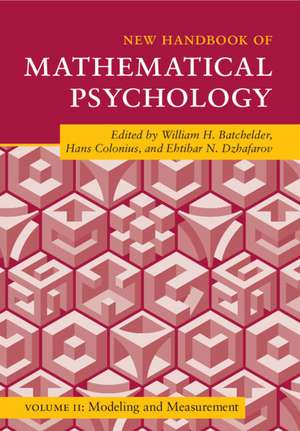New Handbook of Mathematical Psychology: Volume 2, Modeling and Measurement: Cambridge Handbooks in Psychology
Editat de William H. Batchelder, Hans Colonius, Ehtibar N. Dzhafaroven Limba Engleză Paperback – 16 iun 2021
Din seria Cambridge Handbooks in Psychology
- 23%
 Preț: 1254.71 lei
Preț: 1254.71 lei - 11%
 Preț: 449.49 lei
Preț: 449.49 lei -
 Preț: 502.52 lei
Preț: 502.52 lei - 23%
 Preț: 1248.79 lei
Preț: 1248.79 lei - 8%
 Preț: 426.60 lei
Preț: 426.60 lei -
 Preț: 486.56 lei
Preț: 486.56 lei - 5%
 Preț: 441.42 lei
Preț: 441.42 lei - 9%
 Preț: 1282.44 lei
Preț: 1282.44 lei -
 Preț: 494.25 lei
Preț: 494.25 lei - 8%
 Preț: 429.69 lei
Preț: 429.69 lei - 9%
 Preț: 594.29 lei
Preț: 594.29 lei - 23%
 Preț: 1246.12 lei
Preț: 1246.12 lei - 5%
 Preț: 397.85 lei
Preț: 397.85 lei - 8%
 Preț: 424.41 lei
Preț: 424.41 lei -
 Preț: 501.96 lei
Preț: 501.96 lei - 19%
 Preț: 494.19 lei
Preț: 494.19 lei - 5%
 Preț: 718.49 lei
Preț: 718.49 lei -
 Preț: 511.59 lei
Preț: 511.59 lei - 8%
 Preț: 426.60 lei
Preț: 426.60 lei - 8%
 Preț: 427.05 lei
Preț: 427.05 lei - 8%
 Preț: 425.42 lei
Preț: 425.42 lei -
 Preț: 411.92 lei
Preț: 411.92 lei -
 Preț: 272.35 lei
Preț: 272.35 lei - 8%
 Preț: 425.42 lei
Preț: 425.42 lei -
 Preț: 511.21 lei
Preț: 511.21 lei -
 Preț: 370.88 lei
Preț: 370.88 lei -
 Preț: 374.90 lei
Preț: 374.90 lei - 8%
 Preț: 489.89 lei
Preț: 489.89 lei - 8%
 Preț: 427.49 lei
Preț: 427.49 lei -
 Preț: 511.59 lei
Preț: 511.59 lei - 5%
 Preț: 1538.86 lei
Preț: 1538.86 lei - 23%
 Preț: 2195.06 lei
Preț: 2195.06 lei - 8%
 Preț: 428.36 lei
Preț: 428.36 lei -
 Preț: 488.47 lei
Preț: 488.47 lei - 8%
 Preț: 420.13 lei
Preț: 420.13 lei - 9%
 Preț: 850.12 lei
Preț: 850.12 lei - 8%
 Preț: 430.05 lei
Preț: 430.05 lei -
 Preț: 497.35 lei
Preț: 497.35 lei -
 Preț: 283.03 lei
Preț: 283.03 lei
Preț: 457.72 lei
Nou
Puncte Express: 687
Preț estimativ în valută:
87.61€ • 95.20$ • 73.64£
87.61€ • 95.20$ • 73.64£
Carte tipărită la comandă
Livrare economică 21 aprilie-05 mai
Preluare comenzi: 021 569.72.76
Specificații
ISBN-13: 9781009045407
ISBN-10: 1009045407
Pagini: 470
Dimensiuni: 170 x 244 x 25 mm
Greutate: 0.75 kg
Editura: Cambridge University Press
Colecția Cambridge University Press
Seria Cambridge Handbooks in Psychology
Locul publicării:Cambridge, United Kingdom
ISBN-10: 1009045407
Pagini: 470
Dimensiuni: 170 x 244 x 25 mm
Greutate: 0.75 kg
Editura: Cambridge University Press
Colecția Cambridge University Press
Seria Cambridge Handbooks in Psychology
Locul publicării:Cambridge, United Kingdom
Cuprins
1. Stochastic methods for modeling decision making Adele Diederich and Keivan Mallahi-kara; 2. The diffusion model of speeded choice, from a rational perspective Matt Jones; 3. Stochastic foundations of elementary mental architectures Joseph W. Haupt, James T. Townsend and Brett Jefferson; 4. Identifiability of probabilistic models, with examples from knowledge structure theory Jean-Paul Doignon, Jurgen Heller and Luca Stefanutti; 5. Quantum models of cognition and decision Jerome R. Busemeyer and Peter D. Kvam; 6. Computational cognitive neuroscience F. Gregory Ashby; 7. Discovering aggregation properties via voting Donald G. Saari; 8. Categorization based on similarity and features: the Reproducing Kernel Banach Space (RKBS) approach Jun Zhang and Haizhang Zhang; 9. The axiom of meaningfulness in science and geometry Jean-Claude Falmagne, Louis Narens and Christopher Doble.
Recenzii
'This Handbook contains review articles by leaders of the field. It will be a valuable reference for all who are interested in mathematical psychology.' Brian Skyrms, University of California, Irvine
'This volume is the second in a series devoted to presenting a very readable, yet broad and deep, up-to-date perspective on mathematical psychology. It will be of interest to graduate students and experienced researchers who are concerned with modeling and measurement in the psychological and cognitive sciences.' Thomas S. Wallsten, University of Maryland
'These two volumes are a valuable contribution to mathematical psychology; partly representing important summaries of special branches, partly pushing the forefront of research towards new horizons. They should be read by all working in special fields, but also by students who are striving for a general point of view. We are looking forward to the third volume.' Reinhard Suck, Journal of Mathematical Psychology
'This volume is the second in a series devoted to presenting a very readable, yet broad and deep, up-to-date perspective on mathematical psychology. It will be of interest to graduate students and experienced researchers who are concerned with modeling and measurement in the psychological and cognitive sciences.' Thomas S. Wallsten, University of Maryland
'These two volumes are a valuable contribution to mathematical psychology; partly representing important summaries of special branches, partly pushing the forefront of research towards new horizons. They should be read by all working in special fields, but also by students who are striving for a general point of view. We are looking forward to the third volume.' Reinhard Suck, Journal of Mathematical Psychology
Descriere
Shows how foundational mathematical ideas can be employed in the understanding of a variety of psychological phenomena.
